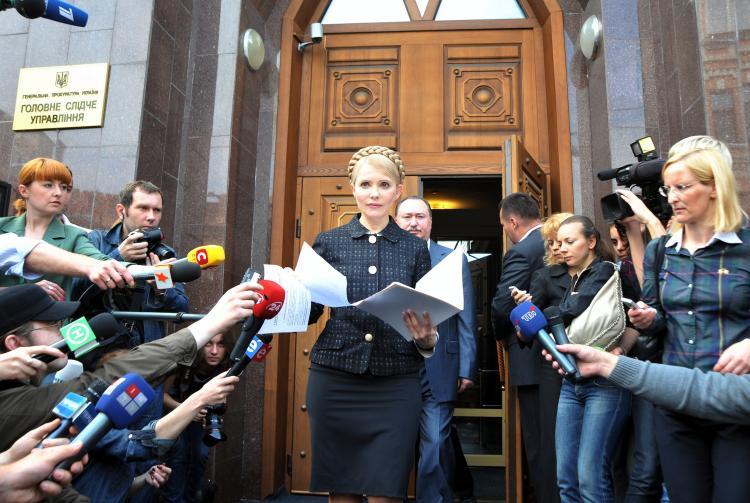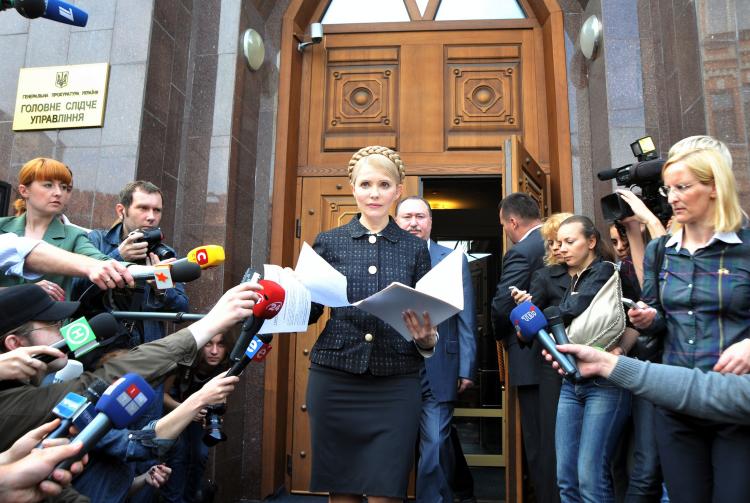KIEV, Ukraine—Former Prime Minister Yulia Tymoshenko received word on May 12 that the previous criminal charges against her have been reopened by the Ukrainian prosecutor general’s office.
The case began six years ago, when Tymoshenko was accused of giving bribes to judges of the Supreme Court to end a case against a former colleague. At that time the case was halted due to lack of evidence, coinciding closely with her elevation to prime ministership.
Tymoshenko was a key player in the Orange Revolution, a campaign of protest and civil disobedience that delivered Viktor Yushchenko to the presidency in 2005. At that time the current president, Victor Yanukovych, was accused of rigging the election, and was toppled by the electorate after a heavily scrutinized revote.
Tymoshenko refuted the accusations, arguing that it was a politically motivated move by the current government, which wants to weaken opposing political forces. “Yanukovych personally ordered the top management of the general prosecutor’s office to find any arguments, no matter what they were, and to jail me for the next three or four months,” Tymoshenko told journalists in front of her office on Wednesday.
Russian-leaning Victor Yanukovych won the presidential elections in February this year, while former Prime Minister Tymoshenko stepped down to become opposition leader.
Since Yanukovych took his post, Russian-Ukrainian ties have improved after years of tension, with top leaders from both countries holding frequent meetings.
He has also attempted to concentrate power by bringing in loyal officials, building a supportive parliamentary coalition, and making allies in regions across Ukraine.
Opposition parties and politicians, including former President Victor Yushchenko, condemned Yanukovych as “authoritarian” for the moves.
Yanukovych claimed that such methods of governance would reap a stable polity and allow overdue reforms to be implemented.
The key agreement for the mutual relationship between Russia and Ukraine to improve was for Ukraine to trade on cheaper gas prices, and for Russia to be allow to prolong its navy’s stay in the Crimean Peninsula until 2042.
The ratification of the deal in Ukraine’s Parliament was met with heavy resistance from the opposition parties; they threw smoke bombs, eggs, and fists over the attempt to pass the deal.
Meanwhile, Ukrainian citizens do not find the agreement on extending the Russian navy’s stay in their country threatening to sovereignty, as the opposition called it.
According to phone surveys provided by the Kyiv-based Gorshenin Institute, more than half of Ukrainians questioned consider the deal to make the relationships between Ukraine and Russia more progressive.
Analysts say that since the Orange Revolution in 2004, Ukrainians have become less inclined to protest because they think such activities do more for politicians than ordinary people.
The case began six years ago, when Tymoshenko was accused of giving bribes to judges of the Supreme Court to end a case against a former colleague. At that time the case was halted due to lack of evidence, coinciding closely with her elevation to prime ministership.
Tymoshenko was a key player in the Orange Revolution, a campaign of protest and civil disobedience that delivered Viktor Yushchenko to the presidency in 2005. At that time the current president, Victor Yanukovych, was accused of rigging the election, and was toppled by the electorate after a heavily scrutinized revote.
Tymoshenko refuted the accusations, arguing that it was a politically motivated move by the current government, which wants to weaken opposing political forces. “Yanukovych personally ordered the top management of the general prosecutor’s office to find any arguments, no matter what they were, and to jail me for the next three or four months,” Tymoshenko told journalists in front of her office on Wednesday.
Russian-leaning Victor Yanukovych won the presidential elections in February this year, while former Prime Minister Tymoshenko stepped down to become opposition leader.
Since Yanukovych took his post, Russian-Ukrainian ties have improved after years of tension, with top leaders from both countries holding frequent meetings.
He has also attempted to concentrate power by bringing in loyal officials, building a supportive parliamentary coalition, and making allies in regions across Ukraine.
Opposition parties and politicians, including former President Victor Yushchenko, condemned Yanukovych as “authoritarian” for the moves.
Yanukovych claimed that such methods of governance would reap a stable polity and allow overdue reforms to be implemented.
The key agreement for the mutual relationship between Russia and Ukraine to improve was for Ukraine to trade on cheaper gas prices, and for Russia to be allow to prolong its navy’s stay in the Crimean Peninsula until 2042.
The ratification of the deal in Ukraine’s Parliament was met with heavy resistance from the opposition parties; they threw smoke bombs, eggs, and fists over the attempt to pass the deal.
Meanwhile, Ukrainian citizens do not find the agreement on extending the Russian navy’s stay in their country threatening to sovereignty, as the opposition called it.
According to phone surveys provided by the Kyiv-based Gorshenin Institute, more than half of Ukrainians questioned consider the deal to make the relationships between Ukraine and Russia more progressive.
Analysts say that since the Orange Revolution in 2004, Ukrainians have become less inclined to protest because they think such activities do more for politicians than ordinary people.





